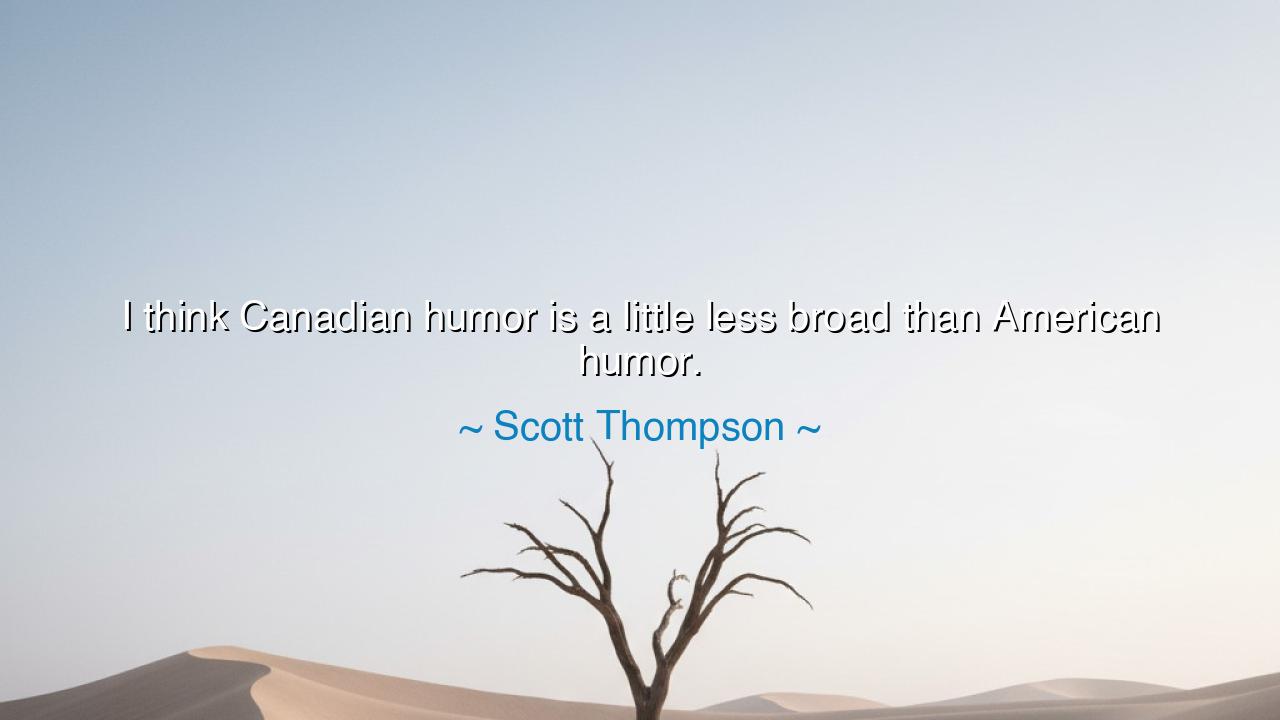
I think Canadian humor is a little less broad than American






In the words of Scott Thompson, “I think Canadian humor is a little less broad than American humor.”
Though spoken with modest simplicity, this reflection contains the wisdom of culture, temperament, and history — for humor, like the soul, bears the imprint of the land and the people who shape it. Thompson, a master of wit and nuance, does not speak of comedy alone, but of character. His observation reveals how laughter itself — that most human of sounds — reflects the spirit of a nation, its struggles, its climate, its humility, and its dreams. In his contrast between Canadian humor and American humor, we hear not rivalry, but revelation: that the way a people laugh tells the truth of how they live.
When he says that Canadian humor is a little less broad, he points to a subtle difference in perspective. Canadian humor, shaped by vast landscapes, long winters, and quiet endurance, often carries a gentle irony, a self-deprecating warmth, and an awareness of absurdity that comes from patience rather than performance. It is humor that whispers rather than shouts, that teases without wounding, that observes rather than declares. American humor, by contrast, has the rhythm of the frontier — bold, expansive, and driven by confidence. It reflects a culture built on motion and magnitude, where laughter must rise above the noise to be heard. Thompson’s words, then, are not critique but balance — a reminder that humor, like light, may dazzle in one land and glow softly in another, yet both illuminate truth.
The origin of this distinction lies deep in the story of these neighboring nations. Canada, born of endurance and diplomacy, learned to laugh quietly in the face of long winters and longer histories. Its humor, therefore, often leans toward the understated and ironic, the comedy of restraint and observation — as seen in the gentle absurdity of The Kids in the Hall or the understated satire of SCTV. America, by contrast, grew from revolution and expansion, its laughter forged in ambition and audacity. Its great comedians — from Mark Twain to Robin Williams — speak with thunder and flourish, reflecting a land where freedom of voice is sacred and expression is boundless. One is the laugh of survival, the other the laugh of triumph — and yet both, at their best, speak to the same human longing: to understand and endure the world through joy.
In this way, Scott Thompson’s insight is not merely about comedy — it is about identity. Humor, after all, is a mirror to the soul of a people. When a nation laughs, it reveals what it values: whether humility or grandeur, subtlety or spectacle. The Canadian tends to laugh at himself; the American, at the grand contradictions of his world. The former’s humor is born of reflection, the latter’s of motion. Both arise from truth, but from different corners of it. Thompson, himself a bridge between the two cultures, sees that contrast clearly — and in his observation lies an ancient truth: that wisdom often speaks softly, while passion declares itself loudly, and the world needs both.
Consider the story of Jonathan Swift, the Irish satirist who, centuries before Thompson, wielded humor like a philosopher’s blade. His Gulliver’s Travels mocked the folly of nations through gentle absurdity — laughter used not to destroy, but to reveal. He understood that humor’s power lies not in volume, but in depth. The same could be said of the Canadian wit — quiet, deliberate, but piercing. Meanwhile, across the ocean, Benjamin Franklin, an American contemporary, filled taverns and papers with bold, witty aphorisms that delighted by their candor. Both men used laughter to teach, but one through subtle irony, the other through vivid expression. Their art reflected the lands they called home — Ireland’s restraint, America’s exuberance — much as Thompson describes today.
The wisdom of Thompson’s words also speaks to a deeper lesson: that laughter is as varied as love — it takes the shape of the people who hold it. One must not mistake gentleness for weakness, nor exuberance for shallowness. The quiet laugh, like the soft rain, nourishes the roots of empathy; the loud laugh, like thunder, shakes the heavens and awakens the spirit. A culture that knows both — restraint and boldness, wit and warmth — is a culture balanced in its humanity.
Thus, let this be the teaching: honor the laughter that comes naturally to your soul. Do not force it to sound like another’s. Whether your humor is quiet or grand, subtle or broad, let it arise from truth, from kindness, and from the courage to see the world clearly. The ancients knew that humor was not frivolity, but wisdom disguised as mirth — the philosopher’s cloak woven with joy. It reminds us that no matter how dark the world becomes, the ability to laugh is proof that light remains.
And so, dear listener, remember Scott Thompson’s reflection: “Canadian humor is a little less broad than American humor.” In those few words, he teaches us that even laughter carries the accent of the soul. Learn to know your own — whether it whispers or rings — and share it freely, for in the echo of laughter lies the oldest wisdom: that life, for all its sorrows, is still worth smiling at.






AAdministratorAdministrator
Welcome, honored guests. Please leave a comment, we will respond soon